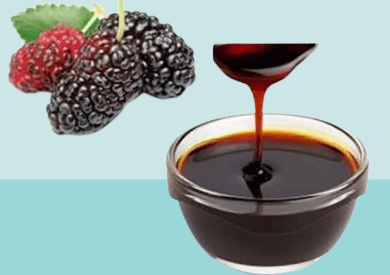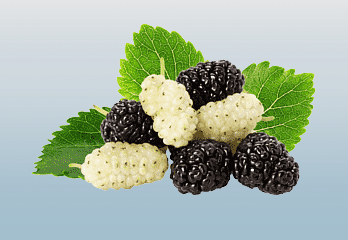What are the benefits of mulberry molasses?
It is good for anemia. It is very rich in iron. It is rich in antioxidants that protect against cancer. Strengthens bones and provides protection against bone resorption. It has protective properties against stomach diseases. Reduces menstrual pain. It contains minerals such as calcium and magnesium. Prevents blood clotting. Protects the health of uterine muscles. Balances cholesterol. Strengthens the nervous system. Cleans the liver. Relieves chest pains. Strengthens the kidneys. It is good for thrush in children. It is a good source of antioxidants. Gives energy.
Mulberry molasses, also known as mulberry syrup or mulberry concentrate, is a sweet and flavorful syrup made from the juice of mulberries that have been boiled down and reduced. It has been used in various cuisines for centuries and is known for its unique taste and potential health benefits. Here are some of the benefits of mulberry molasses:

- Nutrient-rich: Mulberries are packed with vitamins, minerals, and antioxidants, and mulberry molasses retains many of these nutrients. It contains vitamins like vitamin C, vitamin K, and various B vitamins, as well as minerals like iron, potassium, and calcium.
- Antioxidant properties: Mulberry molasses is rich in anthocyanins, resveratrol, and other antioxidants. These compounds help combat oxidative stress and may contribute to reducing the risk of chronic diseases and supporting overall health.
- Heart health: Some studies suggest that mulberry molasses may have a positive impact on heart health. The antioxidants and polyphenols in mulberries can help lower blood pressure, reduce cholesterol levels, and improve blood vessel function.
- Blood sugar control: Mulberries, and consequently mulberry molasses, contain compounds that may help regulate blood sugar levels. This can be particularly beneficial for individuals with diabetes or those at risk of developing the condition.
- Digestive health: The dietary fiber in mulberry molasses can aid in digestion by promoting regular bowel movements and preventing constipation. It may also support a healthy gut microbiome.
- Weight management: Due to its natural sweetness, mulberry molasses can be used as a healthier alternative to refined sugar in recipes and as a sweetener for beverages. This substitution can reduce calorie intake and contribute to weight management.
- Iron content: Mulberry molasses is a good source of iron, which is essential for the production of red blood cells and the prevention of iron-deficiency anemia.
- Immune support: The vitamin C content in mulberry molasses can help boost the immune system, making it easier for the body to defend against infections.
- Skin health: Antioxidants and vitamins in mulberry molasses may contribute to healthier skin by protecting against damage from free radicals and promoting collagen production.
- Culinary versatility: Mulberry molasses can be used in a variety of dishes, including marinades, sauces, desserts, and salad dressings, adding a unique and rich flavor to your recipes.
It’s important to note that while mulberry molasses offers potential health benefits, it should be consumed in moderation, as it is still a source of natural sugars and calories. Additionally, individual responses to mulberry molasses may vary, so if you have specific health concerns or dietary restrictions, it’s advisable to consult with a healthcare professional or nutritionist before incorporating it into your diet.
What are the good effects of mulberry?
Mulberries are known for their potential health benefits due to their rich nutrient content. Here are some of the positive effects of consuming mulberries:
- Rich in Nutrients: Mulberries are a good source of essential vitamins and minerals, including vitamin C, vitamin K, vitamin E, potassium, iron, and dietary fiber.
- Antioxidant Properties: Mulberries are packed with antioxidants, such as anthocyanins, resveratrol, and quercetin. These compounds help combat oxidative stress, reduce inflammation, and protect cells from damage caused by free radicals.
- Heart Health: The antioxidants and fiber in mulberries can contribute to heart health by reducing the risk of cardiovascular diseases. They may help lower blood pressure, improve cholesterol levels, and support overall heart function.
- Blood Sugar Control: Some studies suggest that mulberries may help regulate blood sugar levels. The compounds in mulberries can slow down the digestion and absorption of carbohydrates, potentially aiding in the prevention and management of diabetes.
- Digestive Health: Mulberries are a good source of dietary fiber, which promotes healthy digestion by preventing constipation and supporting a balanced gut microbiome.
- Weight Management: The fiber content in mulberries can help with weight management by promoting a feeling of fullness and reducing overall calorie intake.
- Immune Support: Vitamin C in mulberries is known to boost the immune system, helping the body fight off infections and illnesses.
- Skin Health: Antioxidants in mulberries may contribute to healthier skin by protecting against UV damage, reducing signs of aging, and promoting collagen production.
- Bone Health: Vitamin K, present in mulberries, plays a role in bone health by supporting calcium metabolism and bone mineralization.
- Eye Health: Mulberries contain vitamin A and zeaxanthin, which are essential for maintaining good vision and eye health.
- Cancer Prevention: Some studies suggest that mulberry extracts may have anti-cancer properties, although more research is needed in this area.

It’s important to enjoy mulberries as part of a balanced diet. They can be consumed fresh, dried, or in various culinary dishes, such as smoothies, oatmeal, salads, and desserts. However, as with any food, moderation is key, especially for individuals with specific dietary restrictions or health concerns. If you have any medical conditions or questions about incorporating mulberries into your diet, it’s advisable to consult with a healthcare professional or nutritionist for personalized guidance. Organic mulberry molasses benefits >>
What is mulberry molasses used for?
Mulberry molasses, also known as mulberry syrup or mulberry concentrate, is a versatile and flavorful condiment used in various culinary traditions around the world. Its sweet and tangy flavor profile makes it a popular ingredient in both savory and sweet dishes. Here are some common uses for mulberry molasses:
- Sweetener: Mulberry molasses can be used as a natural sweetener in a wide range of recipes. It can replace sugar or other sweeteners in baked goods, desserts, and beverages, adding a unique depth of flavor.
- Marinades and Sauces: Mulberry molasses is often used as a base for marinades and sauces, especially in Middle Eastern and Mediterranean cuisines. It adds a sweet and tangy note to dishes like grilled meats, kebabs, and roasted vegetables.
- Salad Dressing: Mix mulberry molasses with olive oil, lemon juice, and various seasonings to create a delicious salad dressing. It pairs well with salads featuring greens, fruits, or nuts.
- Glazes: Mulberry molasses can be brushed onto meats or roasted vegetables to create a shiny, flavorful glaze. It works particularly well with poultry, such as chicken and duck.
- Dips: Combine mulberry molasses with yogurt, tahini, or other ingredients to make dips that can be served with bread, crackers, or vegetables.
- Breakfast: Drizzle mulberry molasses over pancakes, waffles, yogurt, or oatmeal for a sweet and nutritious breakfast.
- Beverages: Add a spoonful of mulberry molasses to hot or cold beverages like tea, coffee, or cocktails to enhance their flavor and sweetness.
- Ice Cream Topping: Use mulberry molasses as a topping for ice cream, frozen yogurt, or sorbet to create a delightful dessert.
- Baking: Incorporate mulberry molasses into bread, muffin, or cookie recipes for a distinctive flavor twist. It can also be used in cakes and pastries.
- Traditional Desserts: Mulberry molasses is a key ingredient in various traditional desserts in the Middle East and Mediterranean, such as baklava and ma’amoul cookies.
- Preserves and Jams: Mulberry molasses can be used as a natural sweetener when making homemade jams, preserves, and fruit compotes.
- Condiment: Some people simply drizzle mulberry molasses over dishes like cheese, roasted vegetables, or grilled meats as a condiment for added flavor.
When using mulberry molasses in recipes, keep in mind that it is relatively thick and concentrated, so you may need to adjust the quantity to achieve the desired level of sweetness and flavor. It can be a delightful addition to your culinary repertoire, offering a unique and delicious twist to both sweet and savory dishes.
Is Mulberry Molasses healthy? Yes, it is useful for bronchitis and asthma. Because it is rich in fiber, it softens the intestines and helps constipation. Reduces the risk of heart attack and stroke. It benefits the visual system of the eye. It strengthens the memory. Useful for the brain. It is good against ulcers.
DOES MULBERRY MOLASSES MAKE YOU GAIN WEIGHT?
Mulberry molasses also has an appetizing feature. For this reason, if consumed too much, it can cause you to gain excess weight. This molasses is also very important especially by those who want to gain weight.
BENEFITS OF MULBERRY MOLASSES FOR HAIR
Mulberry molasses not only strengthens the hair but also has an effect on its growth. It also prevents premature graying and nourishes the hair.
HOW SHOULD MULBERRY MOLASSES BE CONSUMED?
Since mulberry molasses has a dense consistency, it is difficult to consume alone. For this reason, you can also consume it by mixing it with tahini.
People with anemia or people with low blood sugar can consume 2 tablespoons on an empty stomach in the morning. What is mulberry molasses? Mulberry molasses benefits >>
Organic mulberry molasses calories
With its mild taste and more fluid consistency, it is usually consumed at breakfast tables and is also used in desserts. The 70-gram medium portion of black mulberry molasses, which has a versatile use, contains 299 calories. There are 30 calories in 1 tablespoon of mulberry molasses consumed against cough, especially in winter.





